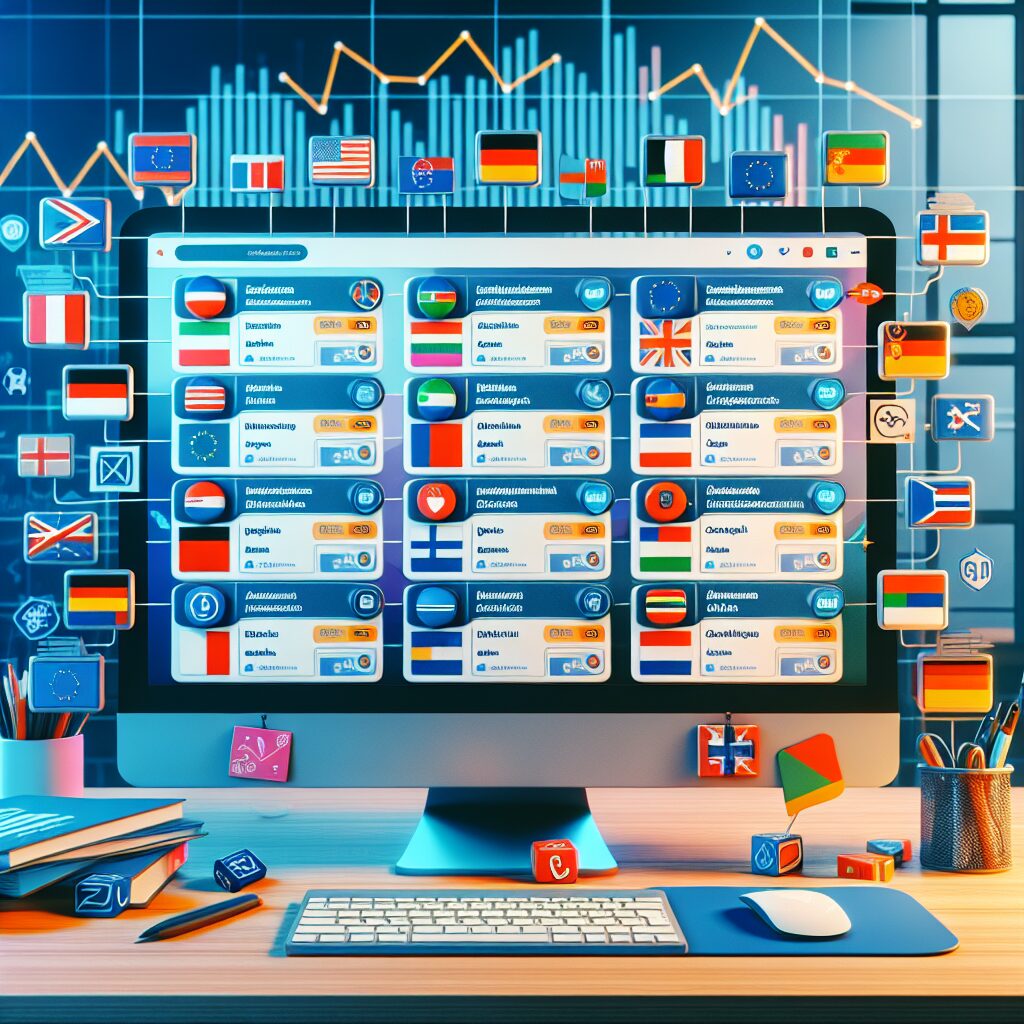About eldris
At Eldris, we automate SEO, multilingual site expansion, and EU compliance for brands scaling across Europe. Our AI-powered platform handles everything from content publishing to regulatory docs—so you don’t have to.
In This Article
- Website cloning software is critical for efficient global expansion and localisation.
- Select tools offering multilingual support, SEO safeguards, and CMS integration.
- AI-powered cloning offers adaptability and performance over traditional methods.
- Paid tools provide deeper customisation, scalability, and compliance than free versions.
- Ensure localisation goes beyond translation to include cultural and technical nuances.
- Always complete a site-wide audit before launching any cloned site regionally.
Understanding Website Cloning for Global Reach
What Does Website Cloning Entail?
Website cloning software allows businesses to duplicate existing websites, either their own or publicly accessible ones, for various use cases such as localisation, testing, redesign, or competitive analysis. Contrary to simple copying, these tools recreate complete functionalities, including style sheets, user flows, backend elements, content, and metadata — offering a mirror image of the original site. For global sellers, website cloning software is instrumental in replicating successful ecommerce storefronts across diverse geographic markets, allowing rapid adaptation while conserving design and development resources. The process can range from replicating an entire website’s structure to creating a modified carbon copy with region-specific content, currency, and language. As the global digital economy expands, the use of website cloning software ensures a competitive edge by accelerating market entry, enabling agile content delivery, and delivering solutions tailored to local consumer preferences.

Why Global Sellers Need Cloning Tools
Benefits in Cross-Border Ecommerce
Global sellers face the ongoing challenge of efficiently scaling operations and maintaining brand consistency across regions. Website cloning software reduces the time, cost, and technical effort required to launch localised versions of a central ecommerce site. It enables global businesses to replicate high-performing sales funnels, product listings, and checkout experiences in foreign-language markets without starting from scratch. Beyond speed, these tools support reassurance in customer journey familiarity while adding room for cultural nuance. For example, sellers who have found success with a UK-based ecommerce platform can swiftly clone and adapt the site for German or Japanese consumers using custom scripts and language packs.
Additionally, nullifying the need for dedicated development teams per region decreases operational overhead. Integrating website cloning software allows for centralised management, uniform updates, and synchronised deployments across time zones. This translates to fewer inconsistencies and improved conversion rates due to trust-building elements that remain unchanged globally while being appropriately localised.
“With the appropriate website cloning software, global sellers gain the agility to penetrate foreign markets without compromising performance, design integrity, or brand coherence.”
Key Features to Look For
Choosing a reliable website cloning software involves evaluating a blend of technical, operational, and localisation-related features critical for global growth. At the most fundamental level, the software should support full-page replication, including HTML, CSS, JavaScript files, and metadata. High-performance tools also capture dynamic content such as sliders, embedded videos, and progressive web app elements while preserving responsiveness and UI integrity across devices.
Key features to prioritise include:
- Multilingual Support: Built-in tools or plug-ins for auto or manual translation, allowing seamless localisation of cloned pages.
- CMS Integration: Compatibility with popular content management systems (e.g., WordPress, Shopify, Magento), enabling easier editing and content updates.
- SEO Preservation: URL mapping, canonical tagging, and proper schema retention to minimise SEO loss or duplication penalties.
- Granular Control: Ability to selectively duplicate elements or pages, excluding outdated or non-relevant content.
- Security Layers: HTTPS cloning, cookie management, and GDPR compliance for privacy assurance on copied platforms.
- Cloud-Based Operation: Seamless access for hybrid teams and better scalability when duplicating at volume.
Most importantly, opt for software that offers version control, rollback functionality, and collaborative tools. This empowers global teams to track modifications across cloned websites more efficiently.
Top 5 Website Cloning Software Options in 2024
As of 2024, multiple tools stand out for their innovation, ease of use, and international deployment capabilities. Below is a review of the top-performing website cloning software ideal for global sellers:
- Eldris AI Web Recreator: Powered by AI-driven adaptation algorithms, Eldris AI not only clones websites but refines them based on target region behaviour. Its seamless language processing and predictive design enhancement make it a top-tier tool. Learn more about Expanding Global Ecommerce with Website Cloning Tools
- SiteDuplicator Pro: Known for deep CMS integration and granular duplication control, SiteDuplicator Pro enables efficient content segmentation and SEO maintenance across multilingual markets.
- Clonify Hub: Best suited for Shopify users, Clonify Hub provides intuitive UI and rapid clone-deploy mechanisms. Includes effortless DNS switching and mobile-first reorientation.
- ScrapeX Engine: Though targeted at security-conscious enterprises, ScrapeX Engine excels in duplicating complex app-based portals with robust server-side scripting compatibility.
- CopyStorm Enterprise: Built for ecommerce giants, CopyStorm focuses on GDPR-ready cloning procedures, automatic alt-text optimisation, and region-based A/B testing modules. In-depth comparison of global cloning tools
Each tool varies in pricing, scalability, and operational complexity. Global sellers must align their choices with team technical skill and business growth trajectories.
AI-Powered Cloning vs Traditional Methods
Artificial Intelligence is revolutionising website cloning by fostering automation, intelligence, and adaptability beyond conventional approaches. Traditional cloning relies heavily on manually downloading site files, adjusting scripts, and editing configurations — which consumes time and introduces inconsistencies. Conversely, AI-powered website cloning software leverages machine learning to detect structural patterns, suggest content alterations, and apply linguistic nuances specific to regional audiences.
Some AI-powered platforms integrate IP geolocation to auto-adjust pricing displays, modify word choices based on regional sentiment, or even reformat content to match cultural reading flows. AI also facilitates real-time error prediction, saving teams from post-deployment issues. Though traditional methods remain useful for smaller operations or static pages, AI-based tools provide unmatched speed, precision, and user insight. As ecommerce evolves, embracing AI in website cloning is less of a luxury and more of a necessity.
Ensuring SEO & Compliance During Duplication
Managing SEO Impact with Website Cloning Software
Search engines frown upon duplicate content, making SEO strategy a central concern during cloning. A capable website cloning software offers canonical URL creation, iframe avoidance mechanisms, and sitemap regeneration — ensuring that cloned sites are indexed appropriately without diluting the original domain’s authority. Additionally, maintaining alt tags, title attributes, and internal linking structures is critical in replicating SEO success across borders.
It is also essential to check for noindex directives and robots.txt modifications post-cloning. Overlooking these simple attributes could result in indexing failures. Ensure every regional clone has unique meta descriptions, H1 tags, and schema markup to differentiate the content contextually and satisfy Google’s criteria.
For compliance, especially GDPR, PCI DSS, or ADA, the software must not only encrypt consumer data but also allow region-specific consent mechanisms. This functionality is vital when dealing with customer data from Europe, California, or Brazil.
Localisation & Multilingual Deployment Strategy
Why Localisation Must Go Beyond Language
Translating words is insufficient for global appeal. True localisation within website cloning encompasses design alignment, currency formatting, cultural reference framing, and even image selection. Leading website cloning software can modify layout directions (e.g., left-to-right to right-to-left for Arabic audiences), convert measurement units, and inject geo-specific FAQs or testimonials.
Moreover, employing native marketing language and idiomatic expressions fosters emotional connection, leading to higher conversion rates. Integration with multilingual CMS add-ons like WPML or Langify furthers this cause, offering backend flexibility for region-based editors. Global sellers are encouraged to routinely involve local moderators in clone reviews to catch contextual nuances that auto-translation tools might miss.
Challenges Global Sellers Face When Cloning
Despite its evident advantages, website cloning presents certain obstacles. Technical complexity increases when shifting between CMS types or hosting architectures. For example, migrating a WordPress clone into a Magento cloud environment may require costly retooling. Language compatibility also becomes a hurdle in script-based automation where non-Roman alphabets (like Mandarin or Hebrew) break layout integrity if not handled carefully.
Server latency and SEO cannibalisation are additional real-world concerns. Sites hosted in a central data centre but accessed from Asia or South America may load slowly, hurting engagement. Furthermore, improper sitemap management may lead to multiple versions of the same page being ranked under similar queries — thereby splitting traffic and lowering SERP positions. Addressing these challenges requires thoughtful software selection, frequent audits, and clear version protocols.
Comparing Free vs Paid Cloning Tools
Free website cloning tools offer basic mirroring functionalities suited for testing or low-risk applications. They often have limitations such as restricted page limits, lack of dynamic content support, minimal language handling, and little to no compliance features. These tools rarely include SEO safeguards, which increases susceptibility to performance loss and ranking penalties when used in live deployments.
Paid tools, on the other hand, come with full-stack control, ongoing support, and enterprise-grade features like CDN optimisation, language auto-adaptation, A/B variant support, and advanced analytics dashboards. Additionally, they often provide enhanced collaboration tools for global teams and scalable hosting solutions. While free tools may be appropriate during prototyping, serious global sellers benefit significantly from investing in a comprehensive, secure, and automated paid cloning platform. Read a related article
Eldris AI as a Strategic Cloning Partner
Eldris AI distinguishes itself as more than just website cloning software — it serves as a strategic partner in globalisation. Utilising machine learning, Eldris AI offers real-time adaptation engines that not only replicate but optimise pages for target regions. Its seamless integration with leading ecommerce platforms ensures that clones are both technically stable and branding-consistent.
Unique features like localisation Analytics, Predictive Load Balancing, and Geofenced Content Deployment set Eldris apart. These allow businesses to experiment with real-time content changes across clones, track effectiveness, and dynamically modify layouts based on user interactions per region. From compliance-driven duplication to cultural sensitivity guidance, Eldris AI simplifies complexity for sellers aiming to scale responsibly and efficiently.
Final Checklist Before Launching a Global Clone
Before hitting publish on your newly cloned website, global sellers should run through a meticulous checklist to avoid overlooked issues. Begin with verifying localisation completeness — this includes text, images, CTAs, forms, and footers. Then confirm server response times in regional testbeds to assess loading fidelity. Additionally, double-check schema markup for relevance to the local market, and test all third-party integrations (like payment gateways or chatbots).
Validate cookie policies based on local regulatory requirements, and confirm active backups in case of rollbacks. A cross-device, cross-browser test is also vital to ensure rendering consistency. Lastly, employ a final audit tool to scan for broken links, missing alt attributes, and metadata gaps. These final steps, though time-consuming, prevent brand misalignment and technical disruptions during post-launch phases.
Conclusion: Choose Smart, Clone Smarter
[CONCLUSION_CONTENT]
Great guide on choosing-best-website-cloning-software-global-sellers – Community Feedback
What is website cloning and why do global sellers need it?
Website cloning allows businesses to swiftly duplicate and adapt their online presence for new markets. For global sellers, it ensures consistency, accelerates multilingual launches, and helps comply with local requirements while reaching wider audiences efficiently.
Which features should I look for in website cloning software?
Key features include multilingual support, SEO automation, compliance capabilities, customisation options, and smart integrations. Ideally, the software streamlines adaptation for different markets, automates SEO, and safeguards regulatory adherence.
Are free website cloning tools effective for international expansion?
Free tools may offer basic cloning functions, but often lack advanced localisation, automation, or compliance features needed for cross-border growth. Professional platforms better support international scale, legal requirements, and ongoing optimisation.








